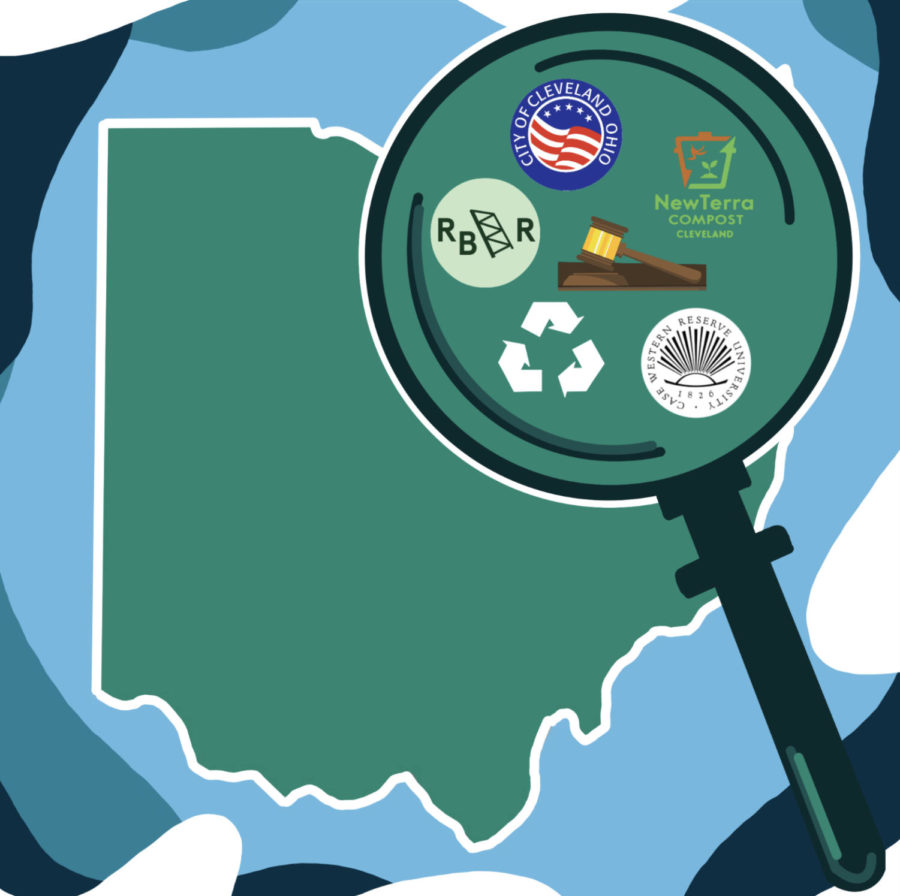Editorial: How Cleveland is leading the way in the fight against climate change
As this year’s Earth Day approaches, it’s incredibly easy to fall down the rabbit hole of climate doom. Corporations continue to take minimal steps to change their wasteful ways and national governments never seem to be doing enough. While we can question to what degree local and individual changes make a difference regarding climate change, if enough people take action, the effects can be profound. There are organizations and initiatives right here in Cleveland, Ohio that you can get involved in or root for.
Firstly, it’s important to note that Ohio is the top state for composting, and many initiatives in Cleveland are working to further improve our standing. This includes food waste management companies such as Rust Belt Riders (RBR), which works to make composting more inclusive and convenient. RBR is aware of the challenges of composting in different settings, such as apartments, supermarkets and college campuses. As a result, the company offers both community drop-off services home and pickup services, producing compost from food waste. RBR aims to divert as much waste as possible from landfills and create economic value for our communities. They work with around 3,000 households and 300 businesses in Northeast Ohio and diverted almost seven million pounds of waste last year. However, there is still a mismatch between the demand for their services and the infrastructure required to process food waste. RBR would ideally like to emulate South Korea’s approach to waste management, where municipalities require the separation of organic and non-organic waste, and residents are taxed a small amount for the amount of food waste they throw away. The approach has led to a 20% reduction in food waste in some municipalities—something we can learn from. RBR also advocates for community building and the role of worker-owned cooperatives in creating a sustainable food system.
Overall, though, it’s clear companies like RBR are making a difference here in our local community and you can be a part of it, even by just signing up for compost curbside pick up for $30 a month. There is more to be done, especially regarding community education about the benefits of composting, advocating for regulations and creating incentives for businesses and individuals to adopt composting practices.
On a city-wide scale, Cleveland’s own Mayor Justin Bibb is preparing the city for ambitious climate initiatives. In cooperation with the Biden administration’s green energy investments, the first electric vehicle charging station on the east side of Cleveland was opened, providing access to underserved communities.
Mayor Bibb’s administration also recently passed the Complete and Green Streets ordinance, which requires the city to restructure its roads to promote environmentally friendly transportation methods—something that U.S. cities have historically ignored.
Despite these exciting green projects, there is much work to be done to ensure that Cleveland can be a clean city for everyone. Lead poisoning from pipes and paint affects communities nationwide, including within the city of Cleveland. Noting this pervasive issue, the Bibb administration has allocated $13 million from the American Rescue Plan to fund the lead-safe housing endowment in Cleveland, in addition to a $50 million investment from the Cleveland Clinic to remove lead paint from every home in the city. Additionally, the Ohio state government is working to remove lead pipes from childcare facilities.
Cleveland’s recycling program has also significantly improved over the past year after having a non-functioning system in past administrations. The program now accepts a range of materials for recycling, including plastic bottles, jugs, cups, metal cans and cups, paper, cardboard, glass bottles, jars and cartons. However, many people are still unsure of what to recycle and how to do so properly; improper mixes can make entire loads unrecyclable. Luckily, the Cuyahoga County Solid Waste District has a page on their website, titled “How to Recycle Right,” where they provide helpful tips on how to properly recycle, detailed explanations on the different varieties of recycling you may find in public and a search engine for certain waste products in case you don’t know how to properly discard them.
Lastly, right here at our own university, the Environmental Law Clinic at the Case Western Reserve University School of Law is a valuable resource for the community, representing clients regarding issues of environmental law and policy issues. Its focus on environmental and energy justice concerns in Northeast Ohio make it notable. By having students be involved with real-world issues, the clinic is training the next generation of lawyers to be dedicated to making a positive difference in the world by tackling complex environmental issues.
These are just a few of the movements in the Cleveland community that are making essential headway in the green movement. The more we participate in and support such initiatives, the more we can show our political leaders that we care about our environment. Hopefully with our own efforts within our communities, we can feel positive about the fight against climate change and the Earth’s future as a whole.
Unsigned editorials are typically written by the opinion editor but reflect the majority opinion of the senior editorial staff.


